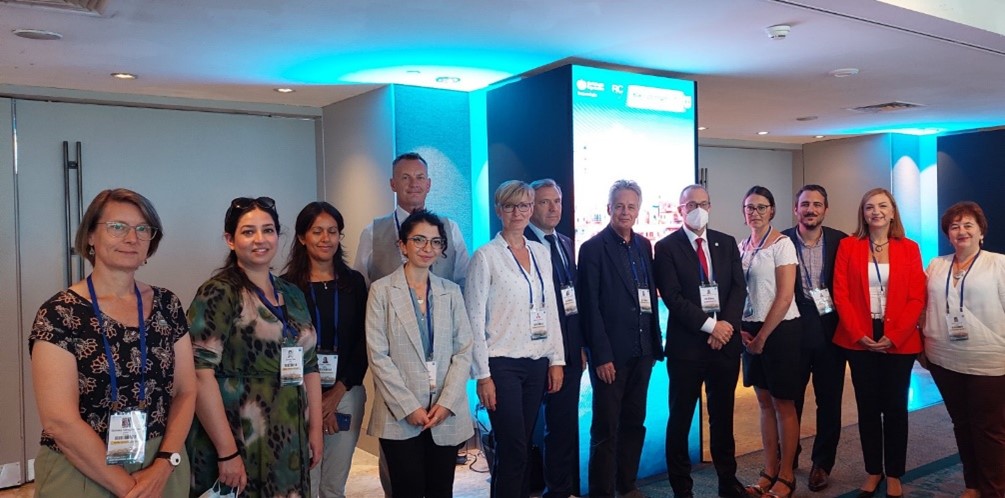
From 12-14 September, EFA travelled to Tel Aviv, Israel to participate in the 72th meeting of the WHO Regional Committee for Europe (WHO/Europe). This annual gathering brings together Europe’s health policy leaders, including national ministers, counsellors, members from the research and the academic community, as well as representatives from 46 international organisations and NGOs including EFA.
A annual milestone for public health policy in Europe, the regional committee examined implementation of the WHO/Europe long-term programme of work. This year the programme consisted of three full-day sessions, serving as a forum to discuss latest policy trends and outlook.
A European agenda with many decisions affecting health
Like every year, the meeting agenda involved crucial topics that cut across disease areas, discussed either in Plenary or in parallel sessions. In terms of issues that affect allergy, asthma, and chronic obstructive pulmonary disease (COPD) patients, EFA specifically focused on the following:
- the WHO European Region Digital Health Action Plan 2023-2030, which aims to help countries scale up the digitalisation in health, based on concrete strategic priorities. The planned actions also aim to support countries in achieving the health-related Sustainable Development Goals (SDGs)
- a session on Strengthening health emergency preparedness, response and resilience, in view of the lessons learnt from the Covid-19 pandemic and as the current Action Plan is approaching its end (2023). A consultation process on a new five-year strategy 2024-2029 shall be launched shortly after the Regional Committee meetinga discussion on health systems’ response to post-Covid condition (parallel session), confirming the higher risk of asthma and COPD patients to develop long Covid, with more severe symptoms
- the Progress Report on the ‘Implementation of the Action Plan for the Prevention and Control of Noncommunicable Diseases in the WHO European Region 2016–2025’, the key strategic document guiding the actions of WHO/Europe in the area of NCDs
- the Progress Reports on tobacco control and the European Environment and Health process
Moreover, EFA followed with great interest the discussions on a ‘European framework for action on alcohol 2022–2025’ and the ‘Tuberculosis action plan for the WHO European Region 2023–2030’.
Therefore, the agenda of the meeting offered EFA a timely opportunity to present and discuss the perspective, and needs of the patients we represent and with policymakers from the WHO/Europe officials, the national level, and other civil society organisations. Our activities, presented by EFA Policy Advisor Panagiotis Chaslaridis prior and during the meeting included:
- Live presentations of the DIG_IT Asthma and COPD and Atopic Eczema Consensus on Burden in Europe projects. The meeting coincided with World Atopic Eczema Day (14 September), and therefore Panagiotis took part in the #InsideOut campaign action - with his clothes inside-out to demonstrate the discomfort atopic eczema patients feel each day!
- Presence in the exhibition space to disseminate printed material such as the and accompanying country factsheets, the AECE report, and the digital health policy briefing of the European Lung Health Group
- Submission of a written statement on tackling the Burden of Atopic Eczema in Europe on the ‘Implementation of the Action Plan for the Prevention and Control of Noncommunicable Diseases in the WHO European Region 2016–2025’
- Co-signature of two joint statements:
In addition, our representative used the opportunity to discuss topics of high relevance for the EFA patient community, including the WHO/Europe Digital Health Action Plan; the upcoming developments on emergency preparedness, response and resilience; and the NCD Action Plan 2016-2025. We also highlighted the Finnish Allergy Programme as best practice that must be supported by the EU Member States.
After an intensive 3-day conference, here are some key takeaways from the EFA perspective:
- The digital transformation in health is an important trend that will define the health sector in the future. It has the potential to improve access to healthcare, enhance disease management, boost health systems’ capacities and reduce inequalities. However, we must ensure that the vulnerable groups, such as those living with a chronic disease, are not left behind. Actions must be focused on digital literacy, training of workforce, standardisation of technological means and clear governance.
- A dual approach to health emergencies, where a proper response is delivered without disrupting essential healthcare services, will prove key as we move forward. This can be a great benefit for people such as chronic respiratory patients, which saw their care disrupted during the Covid-19 emergency. The consultation that WHO/Europe will put forward with Member States and stakeholders will be key in building a consensus on a new strategic framework beyond 2023.
- Deliberations on disease and topic frameworks that are not at the core of EFA’s advocacy, such as those on alcohol and tuberculosis, can still be extremely interesting in terms of understanding the future priorities as well as applicability on EFA-specific issues.
Overall, Non-State Actors from the civil society remain as vibrant as ever in the proceedings of the WHO Regional Committee for Europe, through active participation and valuable contributions to its work. What is needed is an even stronger WHO/European leadership for collaborative framework that enables not only joint action among civil society, but also synergies with WHO/Europe vis-à-vis regional jurisdictions such as the EU.